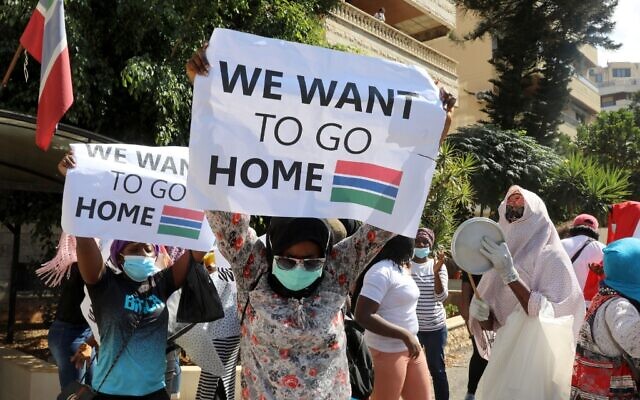By: Betsida Abebe

Tens of thousands of individuals from developing countries take a leap of faith each day to migrate to the Gulf Cooperation Council (GCC) nations–Bahrain, Kuwait, Oman, Qatar, Saudi Arabia, and the United Arab Emirates–with the hope to better themselves and their families back home. High poverty rates in third world countries, coupled with the skyrocketing unemployment rates, and political issues contribute to migration to the GCC. All GCC countries employ a system known as the Kafala sponsorship system. The sponsorship system creates an immense unchecked leverage over workers, producing an environment for human rights violations as well as an erosion of labor standards. Although some GCC countries have promised to work towards abolishing this unlawful system, there continues to be a lack of political will to acknowledge the danger of the Kafala system or to change it. This sponsorship system requires all labor migrants to operate through contracts that usually last for two to three years at a time. While this system manifests in vastly different ways throughout each GCC nations, the ways in which this law operates is surprisingly identical.
The Kafala sponsorship system allows private citizens and companies in the Arab Gulf countries to easily request, sponsor, and finalize the sponsorship process with no legal bondage. Unfortunately, this method takes migrants on a journey of exploitation, deceit, heavy recruitment fees, many forms of abuse, and human trafficking. This dishonest recruitment scheme promotes the sense that the employer has bought an employee, and that the employee is now property. Exploitation on its own takes many forms, including excessive hours of work, withholding of wage payments, little to no leisure time, and forced work demands without compensation. Migrant women take on the role of domestic workers in private homes, which make it easy for employers to abuse them. The Kafala sponsorship was originally adopted in the 1950s, by the Gulf Cooperation Council nations. It aimed to create higher regard for diplomatic relations, to create regulation between employers and migrant workers, as well as to provide a rapid economic boom in these growing nations. Such agreements have been twisted and abused for centuries, making the GCC benefit off the labor of migrant workers. Countless cases are documented by local agencies and international media, such as Human Rights Watch, which widely reported widespread violence, rape, starvation, discrimination, excessive domestic work, debt bondage, and sex trade practices.
Through the uncontrolled nature of the Kafala system, more power is given to the citizens of GCC, leaving migrant workers defenseless. Unchecked growth in the cost of rent, food, alongside wage withholdings by employers make it increasingly impossible for many lower-wage builders and domestic workers to lead a balanced life. This corrupt strategy resembles a form of indirect slavery, making it harder for migrants to escape such dreadful situations. Female domestic workers who attempt to run away fall victim to sex traffickers. The power of the Kafala system is the fuel for contemporary modern-day slavery. The topic of human trafficking and human rights is at the center of today’s contemporary global issues. The GCC countries should take accountability for continuing to not implement virtuous policies that would protect migrant workers. To be an aware global citizen, it is important to fight human rights abuses and human trafficking for moral and social causes. Attention to human rights should be given an equal concern throughout the world, and not selectively. Advocacy in this area of human rights is essential for a few reasons. Human rights have political and moral authority that exceeds far beyond a particular backing of power. It teaches inherent rights and principles in a society, and it promotes accountability to be taken by individuals, and various governmental or non-governmental agents.
Why is it that human rights violations and human trafficking not put to an end, in the GCC? Major problem is that GCC citizens are the entrepreneurs of this sponsorship system. Supposedly, the Ministry of Labor has been trying to improve and strengthen the security by monitoring employers that do not comply with the labor laws set out. Yet again, there is no substantial law implemented by the United Arab Emirates, for example, which causes great contradiction to GCC’s governance. Although some GCC countries have promised to work towards abolishing this unlawful sponsorship system, there continues to be a lack of active political will to acknowledge the danger of the Kafala system or bring about a better alternative. There continues to be no institutions or infrastructures that support or protect fundamental labor law standards for migrant workers in the GCC. To reform a better policy to abolish the Kafala system, acknowledgement of the lack of policy needs to be realized.
Policy solutions the GCC governments should put forth are the following: (a) there needs to be a system of governance that oversees unchecked balance of power. As a form of supervision, there needs to be a legally binding agreement between the employee, the employer, and the third legal party, (b) the implementation of legal policy that criminalizes abuse of any form imposed by an employer should be created, (c) applying the international human rights standards practice should be a mandatory oath signed by employers and companies, and (d) campaigns should be organized to shed light on this corrupt and unchecked sponsorship system. These alternative solutions might seem simple, and they are, because there has not been solid implementation of basic policy standards set by the GCC nations till this day. By implementing stricter regulations, and by prosecuting criminals, the governments in GCC can help establish a fair system for migrant workers.
